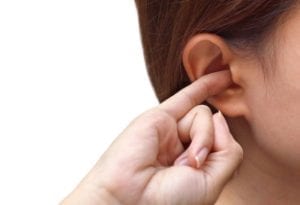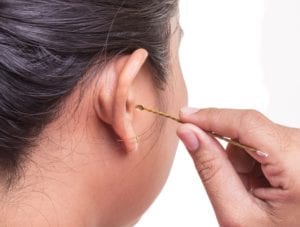Happiness is having a scratch for every itch. Ogden Nash
The most obvious way to manage itchy ears is to get to the itch and scratch it. However, like most itches, scratching will likely make it worse, not better.

The skin in your ear canal is very thin and sensitive, which makes it prone to injury and dryness and the itch in your ear canal is often hard to reach. I have heard of people using all sorts of tools to get to the itch which not only makes the itch worse, it makes it potentially dangerous (for example think: a pointy object in ear next to a quickly opening door – YES it happens).
So what could be causing the annoying itch? And what is the best way to manage it for the long-term?
What is causing your itchy ears?
Wax build up
In most cases, ear canals do a good job at self-cleaning. Wax is designed to work its way out of your ear (often in a spiral pattern) from the eardrum to the ear canal entrance; where you can clean it away with a tissue or cloth. On its journey toward the ear canal entrance, the wax picks up dead skin cells and any other foreign particles and removes them from your ear canal. A clever system to clean this mostly inaccessible orifice. For some people with particularly narrow or bendy ear canals, wax gets trapped on its way out of the ear canal. This can feel itchy and of course, over time it can block your hearing. The best way to manage this it to see an ear nurse who will use a microscope to look down your canal while they suck out the wax build up, of course, they can check for other possible causes of skin irritation or infection.
Allergic reactions
A common cause of itchy ears is an inflammation of the lining of the ear canal due to an allergic reaction. The reaction could be caused by shampoos or soaps, overused earplugs or deeper fitting earphones.
Has there been a recent change in the products you use? The sensitive ear canal skin can be more prone to skin irritations and inflammation than other skin areas like your head or face. Does the itch reduce when you stop using the new product?
Infections – fungal or bacterial
Fungal or bacterial infection of the external auditory canal (otitis externa) is another cause of itch in the ear canal.
Infections of the ear canals occur when there is constant humidity where an infection can grow. This can happen for people who wear occluding earplugs or hearing aids or swim often and is more common in people with diabetes. If you suspect an infection see your GP (for drops) or an Ear nurse specialist who will clear and manage the infection.
Known skin conditions
Itching ears may be a side effect of a systemic skin condition affecting the rest of the body, such as psoriasis or eczema. If you have been diagnosed with one of these conditions, it can also affect your ear canals.[/vc_column_text][/vc_column][/vc_row]
Are you over cleaning your ears?
No ear wax (cerumen) in your ear canal can make them itch
We now know that ear wax (cerumen) is good for our ear canals and performs an important job keeping our canals clean and lubricated. However, some people view ear wax as the enemy and do their best to remove it at all costs. Using earbuds, metal objects or cleaning agents to regularly clean your ears removes the protective barrier over your sensitive ear canal skin and can cause itch and irritation.

Breaking the itch cycle – caused by over cleaning
You will need to build up the normal protective wax to break the itch cycle.
- Do not put your finger or use any instruments in the ear.
- If your ears get wet, you need to shake the water out and use a hair dryer to gently dry them out.
- If your ears are very itchy your GP may be able to prescribe drops to use.
- You could also try some olive oil drops once or twice a week to provide a protective coating which helps for some people.
- You could try some honey eye drops, which you can buy online and use one or two drops intermittently in the ears.
Your ears are likely to be itchy until it starts returning to its normal cleansing function and building up some normal wax. It may take some time for it to settle down.
The post What could be causing your itchy ears? And what to do about it. appeared first on Auckland Hearing.
]]>





